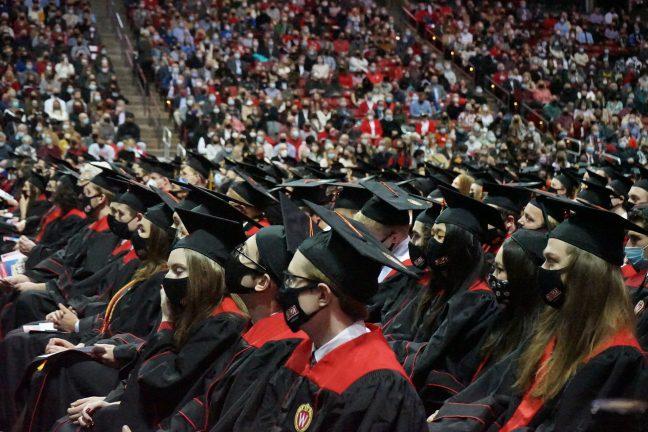I walked onto the University of Wisconsin campus four years ago as an anxious freshman expecting a lot from the years to come. With high hopes of meeting new friends and having a fulfilling academic experience, the challenges I faced hit me square in the face and wiped me out. Anxiety crippled me and limited many of my experiences.
Fortunately, second semester and sophomore year proved to be much more fulfilling. I adjusted and learned to manage a decent amount of my anxiety, allowing me to enjoy the best parts of college. I could finally appreciate the beautiful campus I fell in love with when I was seventeen. Life was great.
Then the pandemic changed our world forever with new stressors altering ever aspect of our lives, most prominently my last two and a half years of college. The comfortable world I had created for myself crumbled, people’s attitudes changed and fear of exposure strained friendships.
My experiences were limited yet again. With that being said, however, this pandemic gave us — the Class of 2022 — skills to overcome challenges and obstacles in the future.
The Badger Herald Editorial Board: Six issues our next chancellor can’t afford to ignore
The anxiety produced by this pandemic was different from anything we had experienced before. The high-stakes of the pandemic made the stress unfamiliar. Threats of sickness, rising death tolls, widespread job losses and isolation all became incredibly overwhelming quickly — especially on a college campus with thousands of students all handling it differently with varying levels of caution.
Luckily, I wasn’t alone this time as everyone was going through the exact same thing. In focus groups held by New America and the State Higher Education Executive Officers Association, students reported online classes made them feel disconnected from their learning environment and peers. These same focus groups showed isolation and social distancing have led to a lack of academic motivation, hindering students and faculty alike.
The pandemic changed the nature of the world forever as it presented — and continues to present— challenges we haven’t had to overcome before in modern history. I never had to worry about being stuck in my room for ten days, with zero human interaction and full reliance on my roommates to care for me. This wasn’t normal and wasn’t easy to adjust to. It was extremely anxiety-inducing for me and everyone around me, causing hostility and uncertainty.
A study published in World Journal of Clinical Cases shows symptoms of anxiety and depression increased during the period of social isolation. These results also demonstrate sleep quality was significantly impaired, the risk of severe depression was twice as high at the peak of the pandemic and social isolation heightened feelings of hopelessness, sadness and loneliness. These struggles were intense, and it was difficult to find the light at the end of the tunnel.
UHS needs new approach to treating disordered eating habits amid high student demand
Despite those effects, attending college in a pandemic has forced us to develop skills and a certain level of courage we didn’t necessarily have before. While different experiences have been difficult in their own right, combating a pandemic during college is a unique experience only we can truly relate to. Online classes, missing out on pivotal social aspects of college and the constant fear of being sent home significantly — and specifically — impacted college students.
Going through that journey has changed the way I see the world and forced me to adjust the way I go about life. For example, learning to manage anxieties about isolation in a college dorm or apartment has taught me how to overcome fears of the unknown and remain calm in situations in which I have zero control.
This has helped me adapt to circumstances in a range of situations and disciplined my reactions. Adjusting to different pandemic routines while traveling between home and school has taught me to react better to change. When going from the comfort of my home with my family and a sense of unity to the isolating independence at school, I had to constantly readjust my routines to be respectful of those around me.
At home, I felt comfortable in every aspect of my day since my family stood as a team and I didn’t feel as though my lifestyle was putting anyone at stake. This changed when I would come back to school as I felt responsible for my roommates’ health as well, feeling guilty if I gave one of them COVID-19. This concern was not comparable to life at home, where I felt comfortable in a social bubble of my family members facing the pandemic together. The adjustment between these two worlds was incredibly difficult and taught me adaptability in times of change.
Institutionalized Islamophobia: UW fails to recognize Ramadan
Managing these stressors and anxieties will benefit each and every one of us as we arrive at obstacles throughout our lives. In forcing us to develop characteristics to survive and maintain mental balance, the pandemic has given us skills to succeed in life that are unique to our specific experience of navigating a pandemic as college students. If we continue to use these skills to overcome challenges and anxieties, there are endless opportunities for what we can accomplish.
Leaving UW and entering the real world is daunting. But we have this unique experience and what it has taught us to help guide us through it. Change still terrifies me, but at least now I know I’ve experienced — and survived — one of the largest threats to modern humanity while successfully earning a college degree. I think many would agree that is something to be proud of.
Elizabeth Ellick ([email protected]) is a senior majoring in political science and pursuing a certificate in gender and women’s studies.














